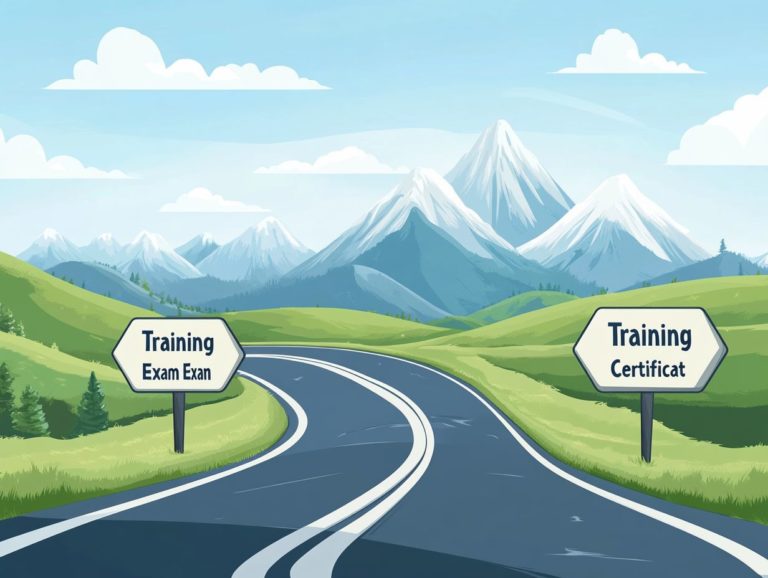Exploring the Role of ITIL Certification
ITIL certification is a valuable asset for IT professionals. It can elevate your career and enhance organizational efficiency.
This article explores the many benefits of obtaining ITIL certification. You ll find a breakdown of the certification types and preparation strategies to help you succeed.
You will also learn what to expect on exam day, ensuring you feel ready and confident.
You will learn how to maintain your certification and keep pace with the evolving IT landscape. Join us as we explore the essential elements of ITIL certification.
Contents
- Key Takeaways:
- Benefits of Obtaining ITIL Certification
- Types of ITIL Certifications
- How to Prepare for ITIL Certification
- Taking the ITIL Certification Exam
- Maintaining ITIL Certification
- Frequently Asked Questions
- 1. What is ITIL certification and why is it important?
- 2. What are the benefits of obtaining an ITIL certification?
- 3. What are the different levels of ITIL certification?
- 4. How can I prepare for an ITIL certification exam?
- 5. Is ITIL certification necessary for a successful career in IT?
- 6. How long does an ITIL certification last and how can I maintain it?
Key Takeaways:

- ITIL certification opens new career opportunities.
- It increases knowledge and skills in IT service management.
- There are various levels of ITIL certifications tailored to your career goals.
- Effective study materials and sample questions are key to exam success.
Understanding ITIL Certification: What You Need to Know
ITIL Certification is part of the IT Infrastructure Library (ITIL). It is a globally recognized standard for IT service management (ITSM), helping you align IT services with business goals.
This framework offers best practices for delivering high-quality IT services. It ensures an enhanced customer experience and increases organizational efficiency.
As you pursue ITIL Certification, you will encounter several levels, including ITIL Foundation, ITIL Practitioner, and advanced certifications like ITIL Master. This pathway allows IT professionals to elevate their skills and contribute meaningfully to their organizations.
ITIL has evolved since the late 1980s to address the challenges IT departments face. It provides structured processes for optimizing service management in today s fast-paced IT environment.
Accreditation validates your knowledge and ensures you can implement ITIL principles effectively. The various modules target specific areas, enabling you to lead initiatives that boost performance and drive improvement.
Ultimately, ITIL Certification can significantly enhance your career prospects. It equips you with the tools necessary for effective service delivery and fosters stakeholder confidence.
Benefits of Obtaining ITIL Certification
Obtaining ITIL Certification offers numerous benefits that enhance your skills as an IT professional. This leads to an improved customer experience and more effective organizational change management.
Achieving this certification elevates your career prospects. It equips your organization to embrace best practices in IT service management, cultivating a culture of improvement while reducing risks.
Career Advancement Opportunities
Unlock your potential and take charge of your career with ITIL certification! ITIL Certification opens a world of career advancement opportunities for you as an IT professional. It boosts your market value and positions you for higher salaries within the IT service management sector.
Organizations actively seek professionals with ITIL certifications like ITIL Foundation, ITIL Practitioner, and advanced certifications, as highlighted in the role of IT certifications in workforce development, to fill crucial roles that drive effective IT service delivery and enhance customer satisfaction.
As you obtain these certifications, you’ll likely qualify for specialized positions such as IT Service Manager, Change Manager, or Incident Manager, all of which are highly sought after.
For example, you might begin your career as an IT support technician. With the guidance provided by the ITIL framework, you can climb the ladder to a management role, where you ll oversee teams and strategies that align IT services with the needs of the business.
Many professionals report significant salary increases. Market research shows that ITIL certification holders can earn over 20% more than their non-certified counterparts.
Real-world success stories are abundant. Many ITIL-certified professionals have transitioned from operational roles to strategic positions, leveraging their expertise to drive efficiencies and elevate service standards.
Improved Knowledge and Skills
Completing ITIL Certification training courses will equip you with a comprehensive understanding of the ITIL framework. This new knowledge will help you apply best practices that lead to improved service delivery, optimized processes, and a commitment to continuous improvement within your organization.
As you dive into areas like incident management, change management, and service level management, these courses will enable you to grasp essential ITIL practices and processes.
Through hands-on case studies and real-world applications, you ll learn how to efficiently resolve incidents, minimize service disruptions, and manage changes with finesse.
This experience not only bolsters your technical expertise but also sharpens your problem-solving skills. You will drive impactful improvements within your teams and enhance the alignment between IT services and overarching business goals.
Types of ITIL Certifications

The ITIL certification pathway offers various options tailored to different levels of expertise and specializations. You ll encounter the ITIL Foundation, ITIL Practitioner, ITIL Expert, and ITIL Master certifications, along with specialized tracks such as ITIL Managing Professional and ITIL Strategic Leader.
Each certification acts as a vital building block, enriching your understanding of the ITIL framework and equipping you to address specific challenges within IT service management effectively.
Different Levels and Specializations
Different levels of ITIL Certification, including ITIL Foundation, ITIL Practitioner, ITIL Expert, and ITIL Master, offer specialized knowledge and skills tailored to various roles within IT service management.
Each level builds upon the last, allowing you to deepen your understanding of ITIL practices and processes as you pursue your career goals.
The ITIL Foundation is your gateway if you’re new to IT service management. It provides essential concepts and terminology, making it ideal for individuals just starting their careers or those looking to elevate their IT knowledge.
As you progress to the ITIL Practitioner certification, you ll enhance your capabilities through practical applications of ITIL, perfect for professionals already engaged in IT operations.
When you reach the ITIL Expert certification, you ll need a comprehensive grasp of ITIL practices. This level is suited for seasoned practitioners looking to refine their expertise and step into leadership roles.
The ITIL Master certification is designed for thought leaders in the field. It gives you the opportunity to showcase advanced competencies in applying ITIL principles to complex organizational challenges.
With various avenues for specialization, such as Agile or DevOps integrations, ITIL training organizations are essential in facilitating your learning journey. They ensure you remain relevant and effective in your role.
Start your ITIL journey today and boost your career!
How to Prepare for ITIL Certification
Preparing for ITIL Certification demands a strategic approach that encompasses selecting the right study materials, enrolling in reputable ITIL training programs, and engaging in ongoing learning to elevate your readiness for the exam.
This effective preparation not only solidifies your understanding of ITIL principles but also boosts your confidence as you approach your certification assessments.
Study Materials and Resources
Utilizing effective study materials and resources is essential for your successful ITIL Certification preparation. You have access to a wealth of resources, including official ITIL publications, online courses, and training organizations that offer tailored programs designed to meet your needs as an aspiring IT professional.
These materials establish a strong foundational knowledge and provide valuable insights into the real-world applications of ITIL practices. For instance, consider books like “ITIL Foundation: ITIL 4 Edition” or explore online platforms such as Coursera and Udemy, which host courses specifically crafted for this certification.
Practice exams play a crucial role in helping you familiarize yourself with the exam format and the types of questions you may encounter. By combining these varied resources, you can ensure a comprehensive understanding of ITIL’s core concepts, allowing you to approach your studies with confidence and clarity.
Tips for Success
Success in your ITIL Certification exams hinges on effective preparation strategies and a steadfast commitment to ongoing learning throughout your study journey.
Craft a detailed study plan, engage actively with ITIL training programs, and incorporate practice exams to bolster your confidence and familiarize yourself with the exam format.
Time management is equally essential in your quest for exam readiness. Break the study material into manageable sections and establish specific timelines to maintain focus and eliminate the chaos of last-minute cramming.
Embrace a variety of study techniques like summarizing key concepts, creating flashcards, or teaching your peers to enrich your learning experience.
Join peer study groups. Collaborating with others offers new insights and deepens your understanding of the ITIL framework. These collective efforts significantly enhance your preparation, increasing your chances of success on exam day.
Taking the ITIL Certification Exam

When you embark on the journey to take the ITIL Certification exam, engage in a structured process that demands your attention to detail.
Familiarize yourself with the exam format and ensure you meet all specific requirements. Achieving a passing score hinges on your understanding of these established criteria.
You must be prepared and well-acquainted with the exam structure, as this familiarity can significantly influence your performance and your success in obtaining the certification.
Exam Format and Requirements
The format of the ITIL Certification exam varies depending on the certification level, but it typically features multiple-choice questions aimed at evaluating your grasp of ITIL concepts and practices.
Before you can sit for the exam, you’ll need to meet specific requirements, such as completing prerequisite training courses through accredited ITIL training organizations.
For example, the ITIL Foundation exam consists of 40 questions, with a passing score set at 65%, and you ll have 60 minutes to finish it.
As you advance to higher levels, like ITIL Practitioner or ITIL Intermediate, you’ll notice that the structure and complexity of the exams evolve, often increasing the question count to 60 or more.
It s essential for aspiring candidates to prepare thoroughly through hands-on training, workshops, and practice exams. These organizations are invaluable, helping you navigate the exam process while ensuring you gain a deeper understanding of the ITIL framework.
This foundation will ultimately pave the way for your success in achieving certification.
Start your preparation today to make your ITIL journey exciting and worthwhile!
Scoring and Passing Criteria
The scoring for the ITIL Certification exam hinges on a predetermined passing score that varies by certification level. This ensures that you show a clear understanding of ITIL principles.
After completing the exam, you ll receive detailed results outlining your performance. These results can serve as a valuable guide for your ongoing learning and professional growth.
Understanding the scoring criteria is crucial. It reflects your comprehension of ITIL concepts and shapes your career trajectory.
A passing score can unlock new opportunities for advancement and bolster your credibility in the IT service management field. Conversely, a failing score may signal the need for additional preparation or training. This awareness helps you align your study strategies with your professional goals.
By fully grasping the implications of your exam results, you can navigate your next steps toward achieving ITIL certification and enhance your employability in a competitive landscape.
Maintaining ITIL Certification
Maintaining your ITIL Certification is essential for staying relevant in the continually evolving landscape of IT service management.
Renewing your certification involves adhering to continuing education requirements, which ensure you stay updated on the latest ITIL practices. This commitment enhances your expertise and allows you to actively contribute to the vibrant ITIL community.
Continuing Education Requirements
Continuing education is essential for maintaining your ITIL Certification. It ensures you remain up-to-date with the latest ITIL updates and best practices in IT service management.
Engaging with ITIL training organizations and participating in community events will help you meet these educational requirements. These organizations offer a variety of courses tailored to different skill levels, covering new frameworks and methodologies while creating valuable networking opportunities.
As you enhance your knowledge through these programs, you contribute to both your personal growth and the collective development of the ITIL community. This ultimately leads to improved service delivery and enhanced career prospects.
Stay actively engaged in learning to boost your skills and stay ahead! This not only reinforces your existing skills but also provides fresh perspectives, enabling you to adapt to the dynamic landscape of IT service management.
Renewal Process

The renewal process for your ITIL Certification requires fulfilling specified continuing education requirements and submitting documentation that showcases your ongoing professional development in IT service management. As a certified professional, engaging with ITIL community activities and training opportunities is essential for keeping your certification valid.
To kick off this process, review the specific renewal requirements set by your certifying body, including the necessary credits for continuing education and relevant workshops. Keeping an organized track of important deadlines is crucial; missing them could lead to a lapsed certification.
Consider participating in forums, webinars, and local meet-up groups. These not only enhance your knowledge but also offer valuable networking opportunities. By staying connected with the ITIL community, you ll deepen your understanding of industry trends, significantly increase the value of your certification, and ensure you remain competent in your field.
Frequently Asked Questions
1. What is ITIL certification and why is it important?
ITIL (Information Technology Infrastructure Library) is a widely recognized framework for IT service management. ITIL certification validates an individual’s understanding and knowledge of the ITIL framework. It is important for IT professionals as it demonstrates their proficiency in implementing best practices for IT service management.
2. What are the benefits of obtaining an ITIL certification?
Some key benefits of obtaining an ITIL certification include improved job prospects, higher salary potential, enhanced understanding of IT service management, and increased credibility and recognition within the IT industry. It also provides individuals with a common language and framework to work from, making it easier to collaborate and communicate with other IT professionals.
3. What are the different levels of ITIL certification?
There are five levels of ITIL certification: Foundation, Practitioner, Intermediate, Expert, and Master. The Foundation level covers basic ITIL concepts, while higher levels delve into advanced IT service management skills.
4. How can I prepare for an ITIL certification exam?
Use study guides, practice exams, and training courses to prepare. Gaining hands-on experience with ITIL principles in real work situations is also crucial.
5. Is ITIL certification necessary for a successful career in IT?
ITIL certification isn t mandatory, but it can boost your career. It provides a recognized framework for IT service management, helping you stand out in a competitive job market.
6. How long does an ITIL certification last and how can I maintain it?
Your ITIL certification lasts a lifetime. To stay relevant, engage in continuing education like training courses and webinars to keep your knowledge fresh.



